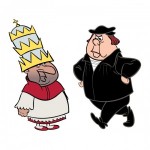as Dr. Steven Lawson explains in a blog article at Ligonier:
William Tyndale (ca. 1494–1536) made an enormous contribution to the Reformation in England. Many would say that he made the contribution by translating the Bible into English and overseeing its publication. One biographer, Brian Edwards, states that not only was Tyndale “the heart of the Reformation in England,” he “was the Reformation in England” (Edwards, God’s Outlaw: The Story of William Tyndale and the English Bible [Darlington, England: Evangelical Press, 1999], 170). Because of his powerful use of the English language in his Bible, this Reformer has been called “the father of modern English” (N. R. Needham, 2,000 Years of Christ’s Power, Part Three: Renaissance and Reformation [London: Grace Publications, 2004], 379).
John Foxe went so far as to call him “the Apostle of England” (John Foxe, Foxe’s Book of Martyrs [Nashville: Thomas Nelson, 2000], 114). There is no doubt that by his monumental work, Tyndale changed the course of English history and Western civilization.
Tyndale was born sometime in the early 1490s, most likely in 1494, in Gloucestershire, in rural western England. The Tyndales were an industrious and important family of well-to-do yeoman farmers, having the means to send William to Oxford University. In 1506, William, age twelve, entered Magdalen School, the equivalent of a preparatory grammar school located inside Magdalen College at Oxford. After two years at Magdalen School, Tyndale entered Magdalen College, where he learned grammar, arithmetic, geometry, astronomy, music, rhetoric, logic, and philosophy. He also made rapid progress in languages under the finest classical scholars in England. He earned a bachelor’s degree in 1512 and a master’s degree in 1515. Before leaving Oxford, Tyndale was ordained into the priesthood.
Cambridge and the White Horse Inn
Tyndale next went to study at Cambridge University, where it is believed he took a degree. Many of Martin Luther’s works were being circulated among the instructors and students, creating great excitement on the campus. In this environment, Tyndale embraced the core truths of the Protestant movement. Continue reading

